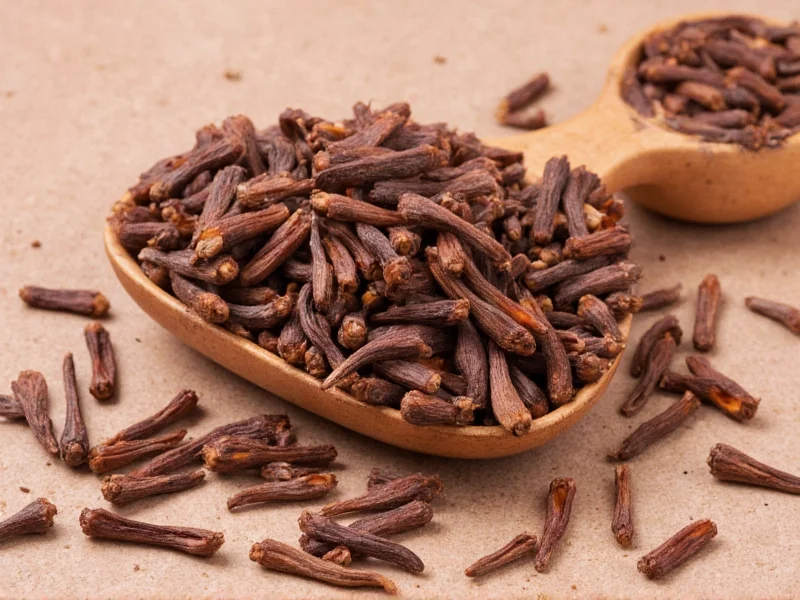Culinary Applications of Cloves
When learning how to use cloves in cooking, understanding their potent flavor profile is essential. These small dried flower buds pack an intense aromatic punch that can transform ordinary dishes into extraordinary culinary experiences. Whole cloves work best in slow-cooked dishes like how to use whole cloves in mulled wine or braised meats, where they can infuse flavor gradually without overwhelming the dish.
For baking applications, ground cloves provide more consistent distribution. When using cloves in gingerbread recipes, combine them with cinnamon and nutmeg in a 1:2:1 ratio for balanced spice notes. Remember that cloves have a strong flavor, so start with 1/4 teaspoon per recipe and adjust to taste. Overuse can make dishes bitter and overpowering.
| Dish Type | Clove Form | Recommended Amount | Preparation Tip |
|---|---|---|---|
| Stews & Braises | Whole | 3-5 pieces | Remove before serving |
| Baked Goods | Ground | 1/4-1/2 tsp | Mix with other spices first |
| Teas & Beverages | Whole | 2-3 pieces | Steep 5-7 minutes |
| Rice Dishes | Whole | 2-4 pieces | Add to cooking liquid |
Medicinal Benefits and Safe Usage
Traditional medicine has utilized cloves for centuries, particularly for how to use cloves for toothache relief. The eugenol content provides natural analgesic properties. To create a simple remedy, gently press a whole clove against the affected tooth or apply diluted clove oil with a cotton swab. Never apply undiluted clove oil directly to gums as it can cause tissue damage.
When preparing clove tea for digestive health, use 2-3 whole cloves steeped in hot water for 5-7 minutes. This preparation may help soothe occasional digestive discomfort, though scientific evidence remains limited. Always consult with a healthcare provider before using cloves medicinally, especially if you take blood thinners or have upcoming surgery, as cloves may affect blood clotting.
Household and Practical Applications
Cloves offer numerous non-culinary uses around the home. One effective method for using cloves as natural insect repellent involves placing whole cloves in sachets near windows or entry points. The strong scent deters many common household pests including moths and ants.
For a natural air freshener, stud an orange with whole cloves and place it in rooms needing fragrance. This traditional how to use cloves in potpourri technique creates a warm, inviting aroma without artificial chemicals. Clove-infused vinegar also makes an effective natural cleaning solution for surfaces.
Proper Storage and Preparation Techniques
Maximizing the shelf life of cloves requires proper storage. Keep whole cloves in an airtight container away from light and heat, where they maintain potency for up to one year. Ground cloves lose flavor more quickly and should be used within 3-6 months. When how to grind cloves properly, use a dedicated spice grinder or mortar and pestle just before cooking for the most vibrant flavor.
For optimal results in recipes, toast whole cloves lightly in a dry pan before use. This simple step enhances their aromatic compounds. Remember that one whole clove equals approximately 1/8 teaspoon of ground cloves when converting recipes.
Common Mistakes to Avoid
Many home cooks make critical errors when using cloves. The most frequent issue involves overusing cloves in recipes, which creates an overpowering, bitter taste. Always start with less than you think you need—you can add more later but cannot remove excess cloves once added.
Another common mistake is leaving whole cloves in finished dishes. Always remove them before serving, as biting into a whole clove creates an unpleasantly intense flavor burst. When using cloves in liquid preparations like how to use cloves in chai tea, strain them out after steeping.
Frequently Asked Questions
Can I eat whole cloves directly?
While technically safe to consume, eating whole cloves directly isn't recommended. Their intense flavor and hard texture make them unpleasant to chew. When using cloves in cooking, always remove whole cloves before serving dishes, or grind them finely for even distribution in baked goods.
How do I substitute ground cloves for whole cloves?
Use this conversion: 1 whole clove equals approximately 1/8 teaspoon of ground cloves. When substituting, start with less than the recipe specifies for whole cloves, as ground cloves distribute more evenly and can become overpowering if used in equal volume.
Are there any safety concerns with using clove oil medicinally?
Yes, undiluted clove oil can cause tissue damage and should never be applied directly to skin or gums. Always dilute with a carrier oil (1 part clove oil to 5 parts carrier oil). Consult a healthcare provider before using clove oil medicinally, especially for children, pregnant women, or individuals with bleeding disorders.
What's the best way to store cloves for maximum freshness?
Store whole cloves in an airtight container away from light, heat, and moisture. Properly stored, they maintain potency for up to one year. Ground cloves lose flavor more quickly and should be used within 3-6 months. For longest shelf life, keep your clove container in a cool, dark pantry rather than near the stove.
Can I grow my own clove tree at home?
Clove trees (Syzygium aromaticum) require tropical conditions to thrive, making them challenging to grow outside USDA zones 10-12. They need consistent warmth, high humidity, and protection from direct sunlight. While possible in controlled indoor environments, most home gardeners find it impractical to grow clove trees for culinary use due to the 6-10 year wait for harvestable buds.











 浙公网安备
33010002000092号
浙公网安备
33010002000092号 浙B2-20120091-4
浙B2-20120091-4